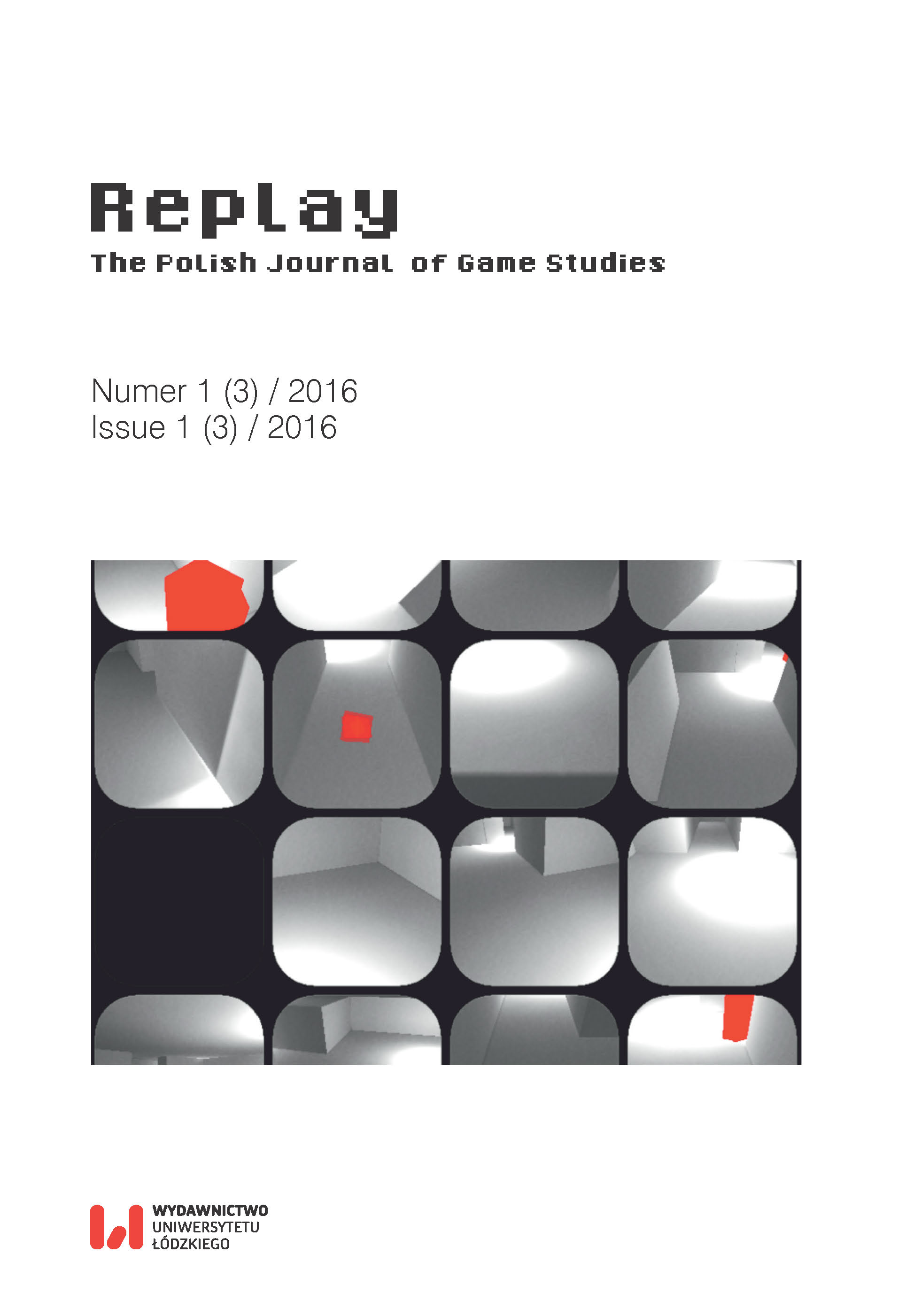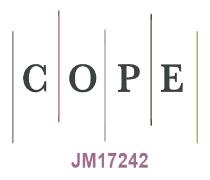Who Is the Note-Worthy Fan? Featuring Players in the Official Facebook Communication of Mainstream Video Games
DOI:
https://doi.org/10.18778/2391-8551.03.05Keywords:
video game fans, Facebook, official communication of video games, fan capital, free labor, fan co-creation, content analysis, fan art, cosplay, e-sportsAbstract
Video game fans participate in the official promotion of video games, either voluntarily, or unwillingly when their fanworks are appropriated and used by video game publishers. The article provides a quantitative overview of the presence of fans in the official social media profiles of four selected mainstream games (Dragon Age: Inquistion, Evolve, Mortal Kombat X and The Witcher 3: Wild Hunt) during a one-year period from August 2014 to July 2015. Combining the traditional method of content analysis and Facebook data-mining, we explore the frequency with which fans appear in social media (including questions of various forms of fanworks and gender) and what user activity is generated by posts featuring fans and fan creations. Results show that fans or their fanworks are featured in 8–24% of all posts depending on a game and in the most common categories of painting and cosplay they generate a comparable level of user engagement as traditional promotional posts.
References
Bennett, L., Chin, B., & Jones, B. (2016). Between Ethics, Fandom and Social Media: New Trajectories that Challenge Media Producer/Fan Relations. In P. Booth & A. Davisson (Eds.), Controversies in Digital Ethics (pp. 107–122). Bloomsbury Academic.
Google Scholar
BioWare (2015). Dragon Age FanQuisition Spotlight – 6/30. Retrieved July 1, 2015, from http://www.dragonage.com/en_US/news/fanquisition-spotlight-jun-30
Google Scholar
Booth, P. (2010). Digital fandom: new media studies. New York: Peter Lang.
Google Scholar
DOI: https://doi.org/10.3726/978-1-4539-1654-4
Boyd, D. (2011). Social Network Sites as Networked Publics: Affordances, Dynamics,and Implications. In Z. Papacharissi (Ed.), A networked self: identity, community and culture on social network sites (pp. 39–58). New York: Routledge.
Google Scholar
Bucher, T. (2012). Want to be on the top? Algorithmic power and the threat of invisibility on Facebook. New Media & Society, 14(7), 1164–1180. http://doi.org/10.1177/1461444812440159
Google Scholar
DOI: https://doi.org/10.1177/1461444812440159
Busse, K. (2013). Geek hierarchies, boundary policing, and the gendering of the good fan. Participations: Journal of Audience & Reception Studies, 10(1), 73–91.
Google Scholar
Busse, K., & Hellekson, K. (2012), Identity, Ethics and Fan Privacy. In K. Larsen & L. Zubernis (Eds.), Fan Culture: Theory/Practice (pp. 38–56). Cambridge Scholars Publishing.
Google Scholar
Carlson, R. (2009). Too Human versus the enthusiast press: Video game journalists as mediators of commodity value. Transformative Works and Cultures, 2.
Google Scholar
DOI: https://doi.org/10.3983/twc.2009.098
Cassell, J., & Jenkins, H. (Eds.), (2000). From Barbie to Mortal Kombat: gender and computer games. Cambridge, Mass.: MIT Press.
Google Scholar
Castronova, E., (2008). Synthetic Worlds: The Business and Culture of Online Games. University of Chicago Press.
Google Scholar
Consalvo, M., (2007). Cheating: gaining advantage in videogames. Cambridge, Mass: MIT Press.
Google Scholar
DOI: https://doi.org/10.7551/mitpress/1802.001.0001
Dijck, J. van. (2009). Users like you? Theorizing agency in user-generated content. Media, Culture & Society, 31(1), 41–58. http://doi.org/10.1177/0163443708098245
Google Scholar
DOI: https://doi.org/10.1177/0163443708098245
Dijck, J. van, & Nieborg, D. (2009). Wikinomics and its discontents: a critical analysis of Web 2.0 business manifestos. New Media & Society, 11(5), 855–874. http://doi.org/10.1177/1461444809105356
Google Scholar
DOI: https://doi.org/10.1177/1461444809105356
Dragon Age: Inquisition, (2015). Dragon Age: Fan Celebration Contest. Retrieved June 21, 2016, from https://www.dragonage.com/en_US/news/fan-celebration-contest
Google Scholar
Evolve. (2015). January 10, Evolve – Wanna share some Evolve content of your own? Maybe Ask... Retrieved June 21, 2016, from https://www.facebook.com/EvolveGame/posts/412997995525300:0
Google Scholar
Fast, K., Ornebring, H., & Karlsson, M. (2016). Metaphors of free labor: a typology of unpaid work in the media sector. Media, Culture & Society. http://doi.org/10.1177/0163443716635861
Google Scholar
DOI: https://doi.org/10.1177/0163443716635861
Feng, G. C. (2014). Intercoder reliability indices: disuse, misuse, and abuse. Quality & Quantity, 48(3), 1803–1815. http://doi.org/10.1007/s11135–013–9956–8
Google Scholar
DOI: https://doi.org/10.1007/s11135-013-9956-8
Freelon, D. G. (2010). ReCal: Intercoder Reliability Calculation as a Web Service. International Journal of Internet Science, 5(1), 20–33.
Google Scholar
Gaider, D. (2013). Video: Sexism and sexuality in games. Retrieved June 25, 2016, from http://www.gamasutra.com/view/news/194571/Video_Sexism_and_sexu
Google Scholar
Helens-Hart, R. (2014) Promoting fan labor and “all things Web”: A case study of Tosh.0. Transformative Works and Cultures, 2014(15).
Google Scholar
DOI: https://doi.org/10.3983/twc.2014.0491
Hellekson, K. (2009). A Fannish Field of Value: Online Fan Gift Culture. Cinema Journal, 48(4), 113–118. http://doi.org/10.1353/cj.0.0140
Google Scholar
DOI: https://doi.org/10.1353/cj.0.0140
Hellekson, K., & Busse, K. (2006). Fan Fiction and Fan Communities in the Age of the Internet: New Essays. McFarland.
Google Scholar
Hernandez, P. (2015, March 11). The People Who Make Brutal Video Game Porn. Retrieved July 1, 2015, from http://kotaku.com/the-people-who-make-brutal-videogame-porn-1690892332
Google Scholar
Jenkins, H. (2006). Fans, bloggers, and gamers: exploring participatory culture. New York: New York University Press.
Google Scholar
Kosnik, A. De, El Ghaoui, L., Cuntz-Leng, V., Godbehere, A., Horbinski, A., Hutz, A., Pastel, R. & Pham, V. (2015). Watching, creating, and archiving: Observations on the quantity and temporality of fannish productivity in online fan fiction archives. Convergence: The International Journal of Research into New Media Technologies, 21(1), 145–164. http://doi.org/10.1177/1354856514560313
Google Scholar
DOI: https://doi.org/10.1177/1354856514560313
Krippendorff, K. (2004). Content analysis: an introduction to its methodology (2nd ed). Thousand Oaks, Calif: Sage.
Google Scholar
Krippendorff, K. (2004b). Reliability in Content Analysis: Some Common Misconceptions and Recommendations. Human Communication Research, 30(3), 411–433. http://doi.org/10.1111/j.1468–2958.2004.tb00738.x
Google Scholar
DOI: https://doi.org/10.1093/hcr/30.3.411
Lastowka, G. (2013). Copyright Law and Video Games: A Brief History of an Interactive Medium (SSRN Scholarly Paper No. ID 2321424). Rochester, NY: Social Science Research Network.
Google Scholar
DOI: https://doi.org/10.2139/ssrn.2321424
Leng, R. H. Y. (2013). Gender, Sexuality, and Cosplay: A Case Study of Male-to-Female Crossplay. The Phoenix Papers, (First Edition), 89–110.
Google Scholar
Lombard, M., Snyder-Duch, J., & Bracken, C. C. (2002). Content Analysis in Mass Communication: Assessment and Reporting of Intercoder Reliability. Human Communication Research, 28(4), 587–604. http://doi.org/10.1111/j.1468–2958.2002.tb00826.x
Google Scholar
DOI: https://doi.org/10.1111/j.1468-2958.2002.tb00826.x
Milner, R. M. (2009). Working for the text: Fan labor and the New Organization. International Journal of Cultural Studies, 12(5), 491–508. http://doi.org/10.1177/1367877909337861
Google Scholar
DOI: https://doi.org/10.1177/1367877909337861
Mortensen, T. E. (2016). Anger, Fear, and Games: The Long Event of #GamerGate. Games and Culture. http://doi.org/10.1177/1555412016640408
Google Scholar
DOI: https://doi.org/10.1177/1555412016640408
Norris, S., & Maier, C. D. (2014.) Interactions, Images and Texts, A Reader in Multimodality. Berlin, Boston: De Gruyter Mouton.
Google Scholar
DOI: https://doi.org/10.1515/9781614511175
Rader, E., & Gray, R. (2015). Understanding User Beliefs about Algorithmic Curation in the Facebook News Feed. In Proceedings of the 33rd Annual ACM Conference on Human Factors in Computing Systems (pp. 173–182). New York, NY, USA: ACM. http://doi.org/10.1145/2702123.2702174
Google Scholar
DOI: https://doi.org/10.1145/2702123.2702174
Rieder, B. (2013). Studying Facebook via data extraction: the Netvizz application. In Proceedings of the 5th Annual ACM Web Science Conference (pp. 346–355). ACM.
Google Scholar
DOI: https://doi.org/10.1145/2464464.2464475
Schwabach, A. (2013). Fan Fiction and Copyright: Outsider Works and Intellectual Property Protection. Ashgate Publishing, Ltd.
Google Scholar
Shaw, A. (2010). What Is Video Game Culture? Cultural Studies and game studies. Games and Culture, 5(4), 403–424. http://doi.org/10.1177/1555412009360414
Google Scholar
DOI: https://doi.org/10.1177/1555412009360414
Siuda, P., & Troszynski, M. (2016). Natives and tourists of prosumer capitalism: On the varied pro-prosumer activities of producers exemplified in the Polish pop culture industry. International Journal of Cultural Studies. https://doi.org/10.1177/1367877916666117
Google Scholar
DOI: https://doi.org/10.1177/1367877916666117
Smith, A. N. (2015). The backer-developer connection: Exploring crowdfunding’s influence on video game production. New Media & Society, 17(2), 198–214. https://doi.org/10.1177/1461444814558910
Google Scholar
DOI: https://doi.org/10.1177/1461444814558910
Stork, M. (2014). The cultural economics of performance space: Negotiating fan, labor, and marketing practice in Glee’s transmedia geography. Transformative Works and Cultures, 2014(15).
Google Scholar
DOI: https://doi.org/10.3983/twc.2014.0490
Švelch, J., & Vesela, V. (2014). Fan Art in Official Promotion of Video Games. Presented at Fan Studies Network Conference 2014. Regent’s University, London, UK, September 28, 2014.
Google Scholar
Švelch, J. (2015). Towards a typology of video game trailers: Between the ludic and the cinematic. G|A|M|E, the Italian Journal of game studies, (4).
Google Scholar
Švelch, J. (2016). “Footage Not Representative”: Redefining Paratextuality for the Analysis of Official Communication in the Video Game Industry. In C. Duret & C.-M. Pons (Eds.), Contemporary Research on Intertextuality in Video Games (pp. 297–315). IGI Global.
Google Scholar
DOI: https://doi.org/10.4018/978-1-5225-0477-1.ch016
Terranova, T. (2000). Free Labor: Producing Culture for the Digital Economy. Social Text, 18(2 63), 33–58. http://doi.org/10.1215/01642472–18–2_63–33
Google Scholar
DOI: https://doi.org/10.1215/01642472-18-2_63-33
Trammell, A. (2014). Misogyny and the Female Body in Dungeons & Dragons. Analog game studies, I(III).
Google Scholar
Tushnet, R. (2007). Payment in Credit: Copyright Law and Subcultural Creativity. Law and Contemporary Problems, 70.
Google Scholar
BioWare (2014). Dragon Age: Inquisition [PC, PS3, PS4, Xbox 360, Xbox One]. Canada: EA.
Google Scholar
CD Projekt RED (2015). The Witcher 3: Wild Hunt [PC, PS4, Xbox One]. Poland: CD Projekt.
Google Scholar
NetherRealm Studios (2015). Mortal Kombat X [PC, PS3, PS4, Xbox 360, Xbox ONE, iOS, Android]. USA: Warner Bros. Interactive Entertainment.
Google Scholar
Turtle Rock Studios (2015). Evolve [PC, PS4, Xbox One]. USA: 2K Games.
Google Scholar










